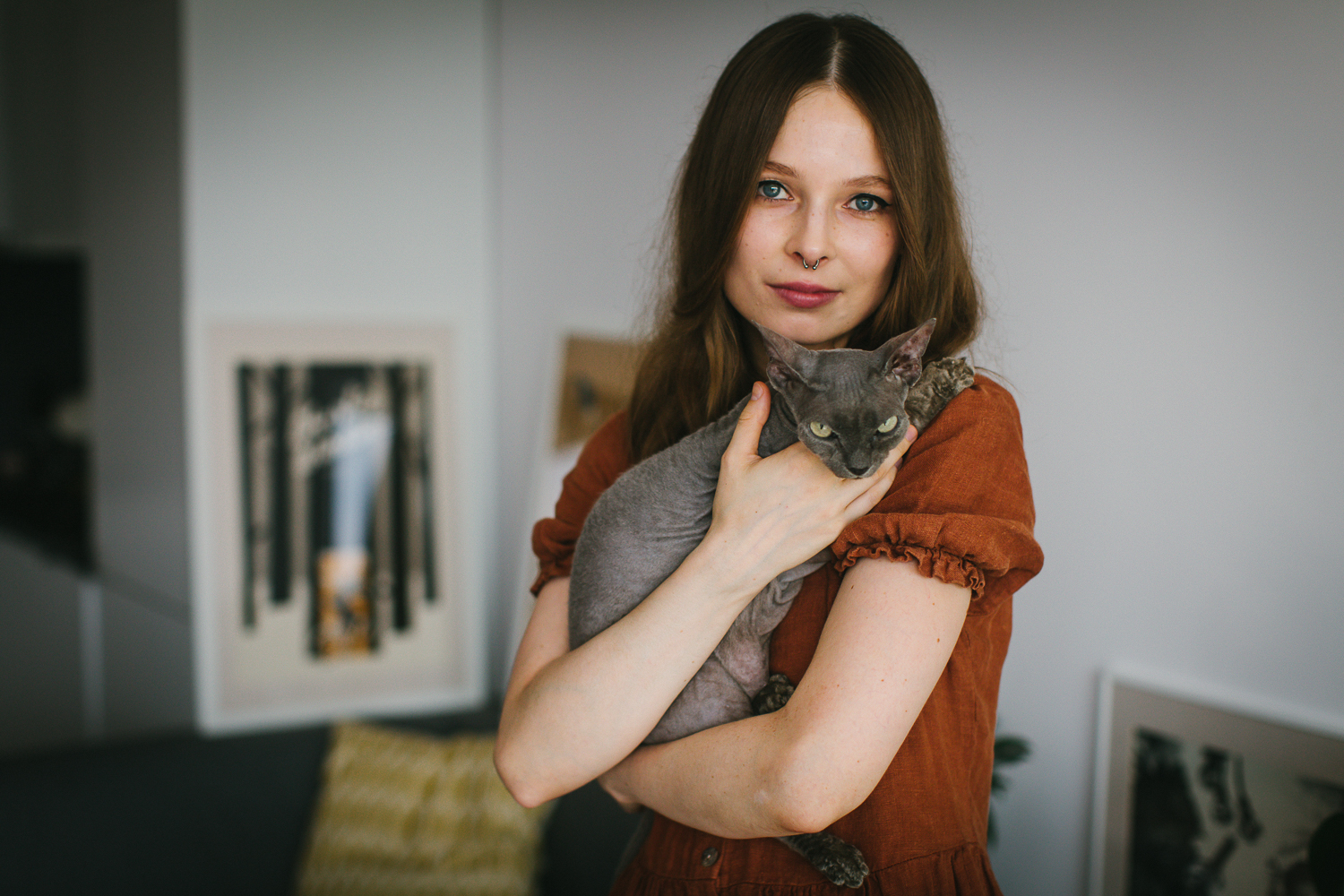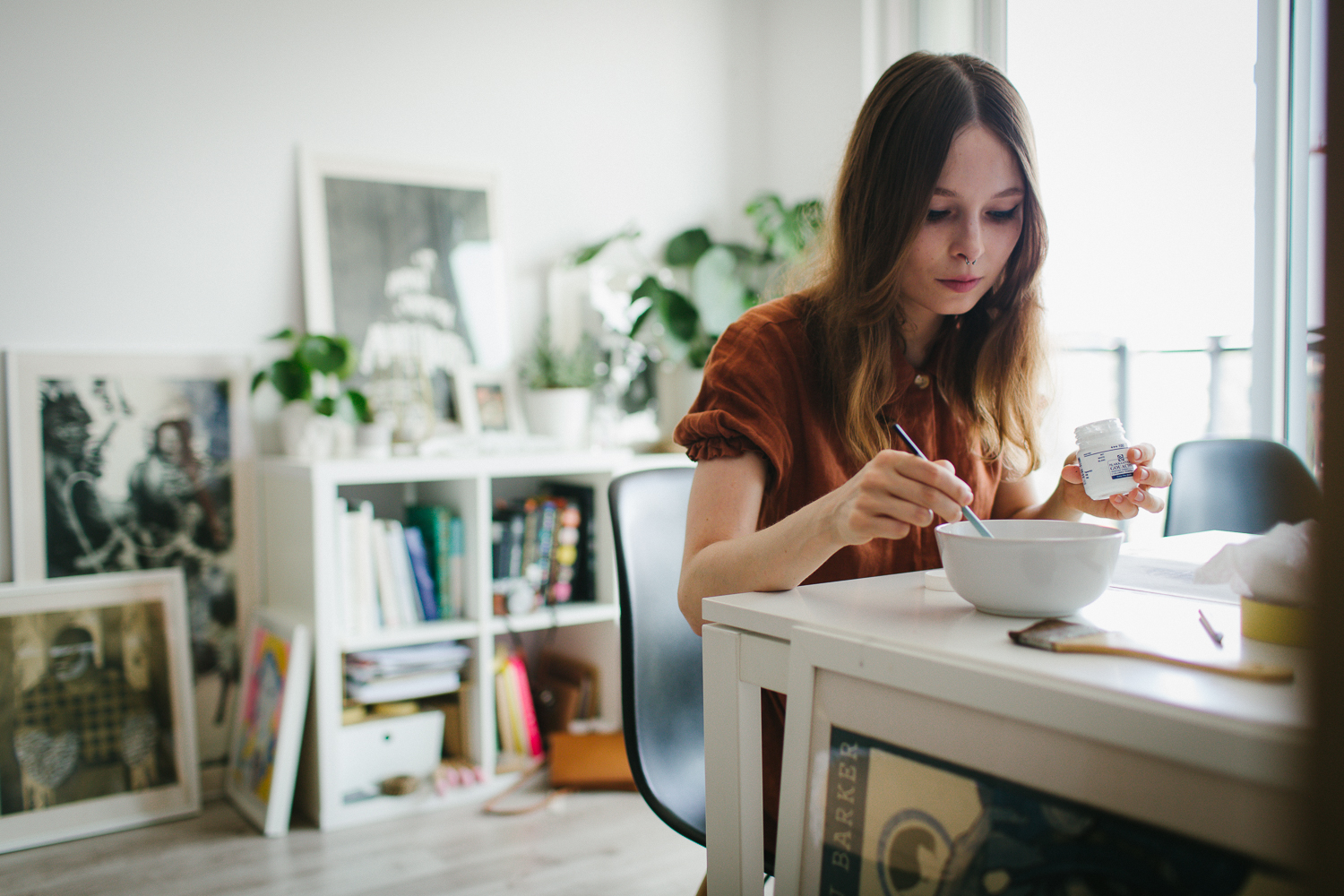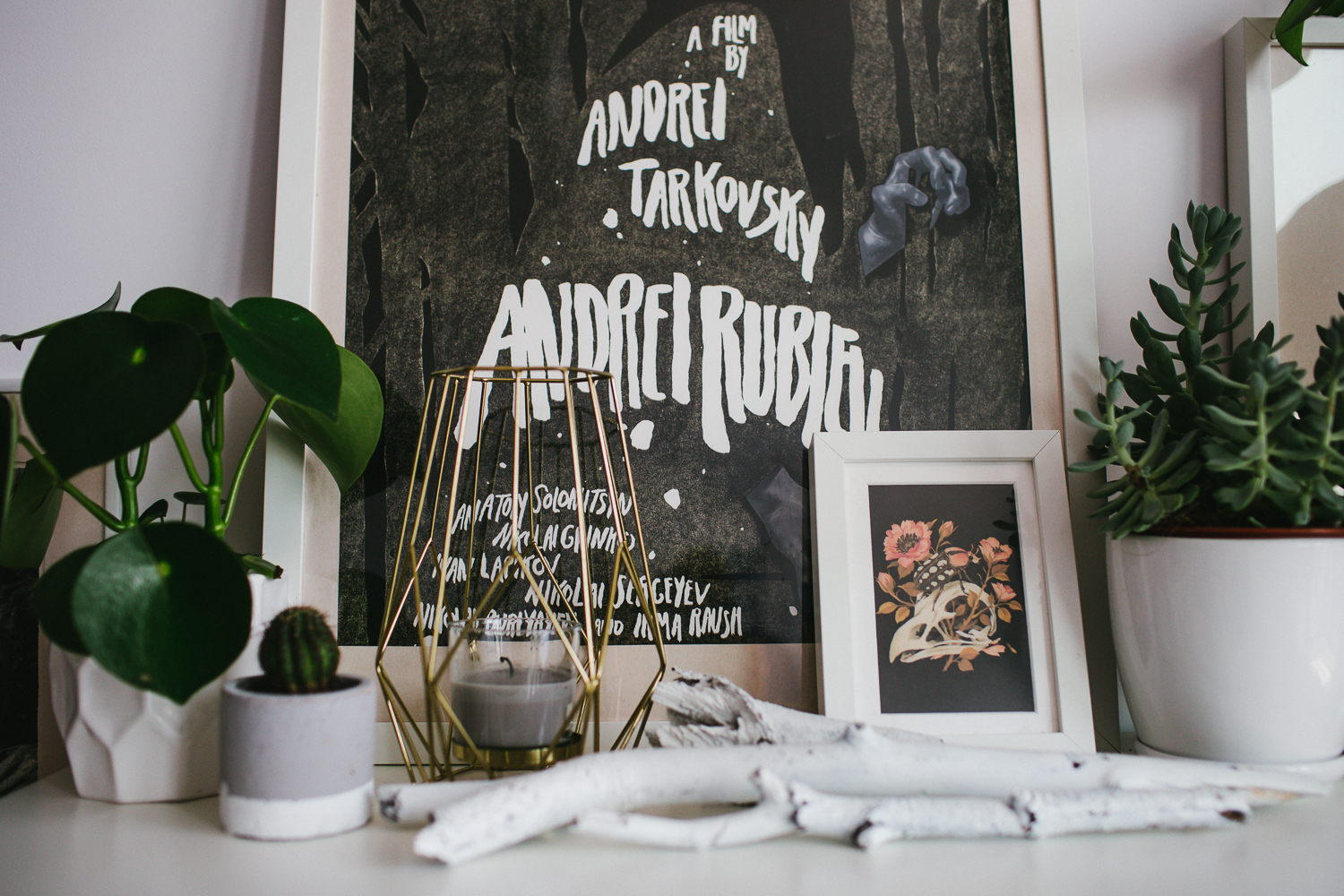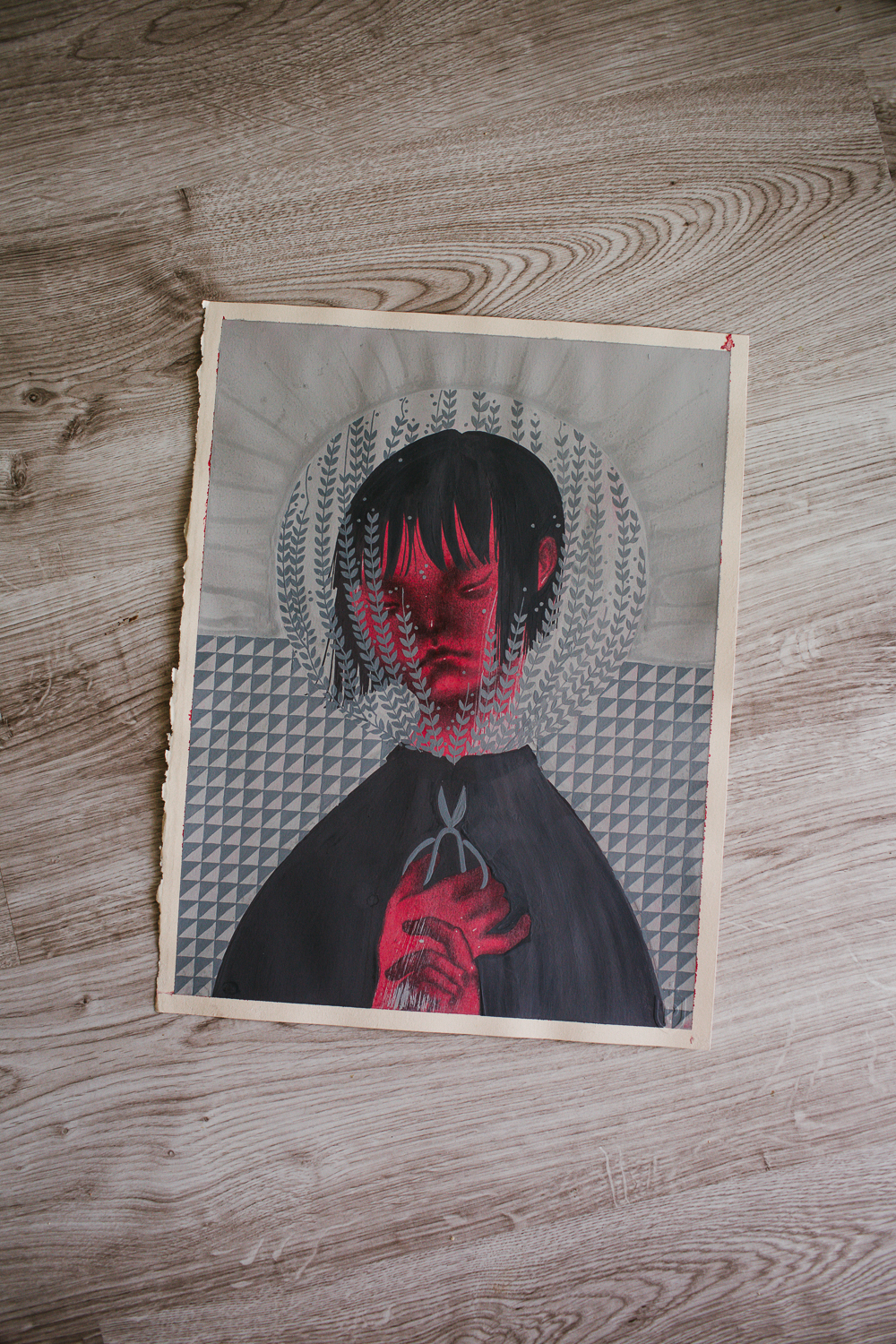—
“I like being sad. It's a deep emotion and a companion that's been with me throughout my life. When I'm happy for too long, I start getting nervous. Life is never perfect, it's never just one emotion.”
PATRYCJA PODKOSCIELNY
–
In a few words, describe yourself and your practice.
I’m an illustrator and graphic designer addicted to traditional techniques and Polaroid cameras. Most of the time I create press illustrations but I'm always ecstatic to jump into any creative field.
–
When did you start your practice?
I probably won’t be original — I loved drawing since I was a kid. I don't remember why, I just always really enjoyed it. No one in my family was in any way associated with any type of art, so I was the odd one out. When I was twelve, my grandpa told me about an art focused middle school & high school a few towns over. It sounded like a perfect fit for me, and so my art education begun at the age of 13. And continues till this day.
“Traditional techniques don't forgive mistakes, they take up a lot of time, which is a scarce resource when working with a client.”
–
How does where you live affect your work?
During high school and at the beginning of my academic life, the Tricity area (Gdańsk, Gdynia and Sopot) was separated in a way from the rest of the polish design and illustration community, which was centralized around Warsaw. And because of that, the Gdańsk Academy of Arts, where I attended, wasn't considered prestigious or even very good. I think this sparked a type of defiance or pushback in me, I had this need to show that it's not the place but the person who determines the level and quality of creativity in their work. I find Tricity inspiring. I've spent all my life living close to the seaside and can't really imagine not being close to water.
–
How do you start your process?
Cleaning my desk and brewing black tea with milk are always my first steps. Then it's time for research (mostly books and internet) and sketching. It always depends on the type of work - if I'm doing something for myself, I reach for my notebooks, filled with ideas waiting for realization; if it's a commission, research is the key to a good start.
–
Is your practice how you support yourself? If not, what else are you working on to do so?
Yes and no. Currently I’m a 100% freelancer, doing illustrations and graphic design, but in the past I also worked as an academic lecturer teaching about Typography, Composition or the Basics of Graphic Design. Currently I’ve been also an assistant in the Lithography faculty at the Academy of Fine Arts in Gdansk.
WHAT IS THE MOST USEFUL TIP OR ADVICE YOU’VE EVER BEEN GIVEN?
It may sound a bit weird but I like the advice: “you need to be able to kill your baby’ ” — it means that sometimes giving up on some projects, even the ones that you're very invested in, will be more beneficial in the future than working on them in pain, just because you need to finish them.
–
What are some challenges you’re facing in your practice?
Traditional techniques don't forgive mistakes, they take up a lot of time, which is a scarce resource when working with a client. I would love to create every commission 100% by hand, on paper, but that's just not possible. The amount of work I do wouldn't be possible without the support of digital tools. I also sometimes meet clients who know the style and character of my work, yet expect something completely different — it's a problematic situation I try to avoid. Even though from time to time working on something completely different can be stimulating, I usually prefer to refine my style instead of jumping from one aesthetic to another.
Like many freelancers, I am no stranger to the loneliness that often comes with this type of work. This highlights one of the biggest challenges I'm facing — myself. I've struggled with depression since I can remember, and that takes a tool on my ability to concentrate, finish commissions, contact clients etc.
“I’ve always had problems with concentration, so having a routine is very helpful. I'm still looking for that “perfect day recipe” to be as creative and productive as possible.”
–
If you were to share one piece of advice with those who aspire to do what you do, what would it be?
A characteristic, individual style doesn't come overnight. It takes a lot of work and practice, everyday. Even if it's just a small sketch or an idea scribbled on a napkin. It took me over 17 years of practice to be where I am today, and I know that there's a lot of work to be done and a long road ahead.
–
Are you comfortable sharing all aspects of your process?
A while ago I created a YouTube channel where I showed how I create illustrations from start to finish. Not long after, I noticed a lot of people using “my” process. It took me years of hard work to get to that stage, and in some way I felt robbed, even though I was the one publicly showing what I do. Since then, I've deleted those videos, but it doesn't mean I'll start hiding in a cave somewhere, just so no one will see me create. I still do illustration workshops and plan on creating more video content. Just this time, I'll do it more carefully. So the answer to this question is inconclusive.
NAME THREE ESSENTIAL THINGS IN YOUR STUDIO.
Aside from typical illustration stuff, it’s: my cat (since I’m a freelancer working from home, he keeps me company), my Polaroids (reminding me of some important moments in my life) and silence (when I work, I need silence to concentrate. I love music, but I usually end up focusing on it too much).
–
What makes your work unique?
I make the assumption that everything was already invented and I don't feel like my work is unique or special. If I was to point something specific, it would be the fact that it's not obvious how my work comes to be (without seeing how I create). I use a lot of techniques that aren't common, either because they take too much time, require specific tools or I made them up myself. On top of that, often there's a digital phase in the process. In the end, it's hard to determine just by sight how my illustration was created, what was exactly the process behind it.
–
Who (or what) inspires you?
Edward Kinsella, Joao Ruas, Sachin Teng, Wes Anderson, Jack White and many more; not only illustrators, but also filmmakers, photographers, musicians. Aside from that, I take inspiration from everything that surrounds me, from music and movies to furniture or plants, conversations overheard on the bus or the label on my tea.
–
What would you be doing if you weren't doing this?
Probably I would be a musician, acrobat or a swimmer. When I was younger I spent 5 years in music school playing violin. Also, I was attending artistic gymnastic classes which I liked very much. And as for swimming — my uncle was an Olympic swimmer, so I spent a lot of time in the pool.
–
How would your audience describe you?
Usually as a sad, weird girl by just looking at my work. When they meet me in person, they're often surprised that I’m smiling a lot. The truth is somewhere in between. I do laugh and have moments of sincere happiness, but I also tend to wear a mask in public, hiding the sadness inside. And the uncomfortable truth is, I think I like being sad. It's a deep emotion and a companion that's been with me throughout my life. When I'm happy for too long, I start getting nervous. Life is never perfect, it's never just one emotion.
–
What's your work routine? Do you find it helpful to have a routine?
Since always I had problems with concentration, so having a routine is very helpful. I'm still looking for that “perfect day recipe” to be as creative and productive as possible. Currently I start every day with a breakfast, since I noticed that not eating in the morning slows down my process. I don't drink coffee, but I can't imagine a day without a cup of black tea. Before work, I clean my desk from the previous day and then my body knows that I'm starting work. I'm a “night owl”, so the ideal scenario would be waking up around 12pm and ending the day around 4am, but since I have to work with clients, that kind of routine is unsustainable.
–
How has your practice changed over time? Where do you see it going?
I feel that the speed in which I create my illustration has greatly improved, even though when I do something for myself I tend to work slower, take more pleasure from the process. I've also noticed that other disciplines of design started to interfuse with my illustration, like typography or geometric compositions. Also the color palette I use seems to widen with time. It's hard to determine where it's all going, but I know I keep developing myself and my skills.
–
What are you currently working on?
I'm currently finishing the visual identity of a music festival called Sacrum Profanum. Simultaneously, I was preparing some illustrations for na exhibition that will take place in Japan, and I'm working on my first album cover.
















































